Tech
Cyber, Formerly CyberConnect, Unveils Social-Focused Layer 2 on OP Stack

May 15: Cyber, the just-unveiled rebranding for the developer formerly known as CyberConnect, has launched its own layer-2 network in the Ethereum blockchain ecosystem, describing it as the “first L2 for social.” According to the team, the new chain relies on “top modular solutions. Cyber integrates Optimism’s OP Stack, EigenDA and custom features to provide low fees, high TPS and a user-friendly experience.” According to a blog post: “AltLayer will manage the rollup’s technical launch, ongoing management, operations and future upgrades. With AltLayer’s help, Cyber is one of the first OP Stack Chains with Plasma Mode deployed to mainnet. Plasma Mode enables OP Stack chains to leverage alternative data availability (DA) layers to Ethereum Mainnet, significantly reducing their transaction costs while minimizing tradeoffs to security and decentralization.”
Gnosis Launches ‘Genome,’ a Native Digital ID Service With Human-Readable Names
May 15: Gnosis announced the launch of Genome, a digital ID service native to Gnosis Chain. According to the team: “Developed in collaboration with Web3 domain and identity platform SpaceID and Web3 messaging protocol dm3, Genome allows users to translate their lengthy, technical wallet addresses to human-readable names, making it easier to send and receive transactions and interact within the Gnosis ecosystem. Genome automatically grants users ownership of both .GNO and .gnosis.eth names, providing a seamless, interoperable user journey within Gnosis across EVM-compatible blockchains.” The domains are interoperable with ENS. (GNO)
Humanity Protocol Raises $30M at $1B for Decentralized Identification to Rival Worldcoin
Lightning Labs CEO Describes Test Transaction of Stablecoins Atop Bitcoin Using Taproot Assets
Komodo Plans Transition to Proof-of-Stake From Proof-of-Work
May 15: Komodo, a project for blockchain interoperability and atomic swap technology, plans to transition its blockchain to proof-of-stake from proof-of-work, according to a press release: “This transformative shift underscores Komodo’s unwavering commitment to environmental sustainability, as PoS consumes significantly less energy compared to PoW…. Once implemented, KMD holders will be able to secure the Komodo blockchain by staking KMD. In turn, users will earn part of the 1 KMD block reward proportional to the staked amount. The KMD consensus change will coincide with the annual network upgrade in 2025 or 2026.”
Evmos Introduces ‘EvmOS,’ for EVM Compatibility on Cosmos SDK, Plans XRP Ledger Integration
May 15: Evmos introduced evmOS, a modular and customizable tech stack offered by Evmos. According to the team: “evmOS enables EVM compatibility and full customizability on top of the Cosmos SDK. Ripple and Peersyst will leverage evmOS to further develop and enhance the XRP Ledger (XRPL) EVM sidechain, which is currently in Devnet. Powered by evmOS, the XRPL EVM sidechain aligns with industry standards and joins one of the most versatile Web3 ecosystems, the interchain.”
XR Foundation Launches Gaming-Dedicated Blockchain Built on Arbitrum Technology
May 15: XR Foundation, in partnership with Saltwater Games, announced the launch of its gaming-dedicated blockchain, XR One. “Built on Offchain Labs’ Arbitrum technologies, the Layer 3 XR One promises unparalleled performance and security benefits of Ethereum, setting a new standard for interactive, continuous development and entertainment,” according to the team. David Plisek, chief operating officer of Saltwater Games, said in a press release that “XR One has been in the works for a couple of years, and we have been deep in conversations with a range of blockchain technology partners, waiting for the convergence of technologies to enable us to take the leap. Finally the time has arrived, and the team at Offchain Labs have delivered a truly scalable technology-driven ecosystem.”
Worldcoin Foundation Launches ‘Secure Multi-Party Computation’ System
May 15: The Worldcoin Foundation on Wednesday announced it “launched and is open sourcing a novel secure multi-party computation (SMPC) system.” According to the team: “The system, available now in a GitHub repository for any organization to use, aims to set a new standard for data protection, including the protection of biometric data. The Worldcoin Foundation also announced that, after the migration of iris codes to the new SMPC system, the previous uniqueness-checking system, including iris codes, was securely deleted.”
Protocol Village is a regular feature of The Protocol, our weekly newsletter exploring the tech behind crypto, one block at a time. Sign up here to get it in your inbox every Wednesday. Project teams can submit updates here. For previous versions of Protocol Village, please go here. Also please check out our weekly The Protocol podcast.
Lens, a Stani Kulechov-Overseen Social Project, to Launch Own Chain With ZkSync
May 14: Lens Lab, a part of the Stani Kulechov-led Avara and the team behind Lens Protocol, a Web3 social platform built on Polygon PoS, announced that it is now developing its own blockchain network, Lens Network. The new network will be built on Matter Labs’ ZK Stack, powered by zkSync on Ethereum. “The Lens Network will set a new baseline/precedent for how social networks should be built,” Alex Gluchowski, co-founder and CEO of Matter Labs, said in a press release. “Users care about owning their data, censorship of information, freedom of speech, and whether their personal data is sold by a select few companies, but this can’t come at the cost of a user-friendly interface, speed and safety. The Lens Network on zkSync solves this.” According to the press release: “The permissionless Lens Network will be rolled out in three phases, starting with a Validium using ZK compression techniques on Ethereum to ensure data accessibility. Later phases will introduce separate Validium chains to support various use cases of social networks with variable levels of private and public interactions, culminating in a Volition network that combines rollups and Validium for ultimate security and flexibility.”
Polkadot Debuts ‘Asynchronous Backing’
May 14: Polkadot, the layer-1 chain ecosystem co-founded by Ethereum co-founder Gavin Wood, has debuted Asynchronous Backing, according to the team: It sets the stage for Polkadot 2.0, “a wave of enhancements expected to significantly improve the scalability, cost, speed and flexibility of the network, and accelerate growth of decentralized applications,” according to the team. “Asynchronous Backing cuts block time in half (from 12 to 6 seconds) enables parallel transaction validation block production, and delivers up to 10x higher throughput for Polkadot’s parachain consensus protocol.” (DOT)
Hylé, for Verifying ZK Proofs, Closes $2.6M Funding Round Led by Framework
May 14: Hylé, a blockchain that specializes in zero-knowledge proof (ZKP) verification, announced the closing of a $2.6 million funding round led by Framework Ventures, a crypto-native venture capital firm. Additional participants in the round included Cherry Crypto, as well as Fabric Ventures, Frst Capital and Heartcore Capital, bringing Hylé’s total initial funding to $3.4 million. According to a press release: “The Hylé network is built specifically for ZKP verification and will be running its own consensus mechanism. Hylé will verify all zero-knowledge proof schemes, and will give users and app developers the flexibility to choose the system that best fits their needs. With Hylé, applications are free to choose their execution environment, their data availability solution and their proof system, all the while remaining permissionless.” Currently, Hylé has released a public devnet with key partners in the rollup-as-a-service space, according to the release.
Hylé’s verifier in a system (Hylé)
Owlto Finance, Intent-Centric Interoperability Protocol, Raises $8M
May 14: Owlto Finance, an intent-centric interoperability protocol, raised $8 million in a strategic funding round led by Bixin Ventures and CE Innovation Capital, with participation from Hailstone Labs, Skyland Ventures, Presto Labs and SNZ Capital. Owlto’s innovative AI Agent protocol suggests optimal bridging paths across multiple chains, simplifying and securing cross-chain transactions.
Peter Thiel’s Founders Fund, Vitalik Buterin Back $45M Investment in Polymarket
May 14: Polymarket, the cryptocurrency-based prediction market platform that’s enjoying a breakout year in the run-up to the U.S. presidential election, raised $45 million in a series B funding round with a roster of big-name investors. Billionaire Peter Thiel’s Founders Fund is the lead investor, Polymarket founder Shayne Coplan told CoinDesk via Telegram message. Other participants include Ethereum creator Vitalik Buterin, 1confirmation, ParaFi and Dragonfly Capital, Coplan said. He did not disclose how much the company was valued in the transaction. The round follows a previously undisclosed $25 million series A led by General Catalyst.
Anomaly, AI-Powered Layer-3 Network Focused on Gaming, Raises $1.45M
May 14: Anomaly, developer of an AI-powered zero-gas layer-3 network focused on gaming and Telegram users, has raised $1.45 million in an oversubscribed pre-seed funding round led by industry players including Decasonic, Shima Capital, BreakOrbit and Round13 Capital. According to the team: “Additionally, Web3 luminary and The 333 Club founder Zeneca has also made a strategic investment, endorsing Anomaly’s vision. Anomaly is an avant-garde AI gaming studio and Layer 3 blockchain that integrates custom AI engine built mini-games on widely used social platforms. The company is poised for a node sale and an ecosystem token launch later this year, promising to further cement its position in the Web3 gaming ecosystem.”
Indian Crypto Exchange CoinDCX’s DeFi Arm Okto to Launch Blockchain and OKTO Token
May 14: Indian crypto exchange CoinDCX has expanded what started as the Okto wallet into an Okto ecosystem, which will include launching a blockchain, a token, and a points program starting Tuesday. The aim is to give global users a single-click mobile experience while traversing the Web3 space, its co-founders Neeraj Khandelwal and Sumit Gupta told CoinDesk in an interview. “We believed all CeFi platforms would eventually have a DeFi arm,” Gupta said. “The Okto Chain will power thousands of applications being built in the Web3 space.”
Stellar Development Foundation Gets Investment from Blockchain Accelerator Draper University
May 14: Stellar Development Foundation is “receiving significant investment from blockchain accelerator Draper University, in which both organizations will jointly launch the Stellar Foundation Hacker Houses and Accelerator Programs,” according to the team “This initiative will impact 80 startups currently building on the Stellar network and caters to early-stage platforms leveraging smart contracts to converge AI and blockchain technology.” A representative told CoinDesk that Draper University is investing $50,000 in 10 Web3 companies and giving a $20,000 grant to builders through its hacker house.” (XLM)
Amberdata Launches ‘ARC,’ an Open-Source Master Security Database
May 14: Amberdata, a provider of crypto market data, has launched “ARC (Asset Reference and Classification), an open-source security master database that enables financial institutions to segment and view the digital asset universe with a consistent lens,” according to the team: “This innovative database eliminates proprietary biases and ensures up-to-date information through community input. By bringing traditional finance data standards to the digital asset space, ARC facilitates accurate record-keeping with enhanced transparency, supporting institutional confidence in digital asset adoption.”
ChainML Unveils Theoriq, an ‘AI Agent Base Layer’
May 13: ChainML, a protocol for decentralized computation, unveiled Theoriq, “our revolutionary AI agent base layer, launched after successfully raising over $10M in seed and super seed rounds, led by Hack VC,” according to the team: “Theoriq redefines AI agent development with its principles of composability, extensibility and community governance, aiming to democratize AI through blockchain technology.”
Overview of Theoriq’s solution (Theoriq.ai)
Gateway.fm Launches ‘Node-as-a-Service’ Solution
May 13 (PROTOCOL VILLAGE EXCLUSIVE): Gateway.fm has launched its Node-as-a-Service (NaaS) solution to simplify the process of setting up and managing nodes, “making it easy for project communities to acquire nodes and contribute to network security, and earn rewards,” according to the team. “Upon purchasing a node, users receive a unique Node License NFT for proof of ownership. NaaS works with zkEVM roll ups, not just Optimistic, and enables projects to conduct strategic node sales to generate revenue before their networks go live. Projects can create tiered options with varying price points, token limits and durations to cater to different requirements.”
Safe Introduces ‘Native Swaps’ With CoW Protocol Integration
May 13: Safe has announced the introduction of native swaps. According to the team: “This new native token swap feature integrates the CoW Protocol and is built directly into the world’s most used multisig wallet, Safe{Wallet}. In partnership with CoW Protocol, this integration leverages CoW Protocol’s advanced aggregation and intent-based architecture to access a vast liquidity pool across decentralized exchanges, offering Safe{Wallet} users low prices and a wide selection of tokens for seamless trades on CoW Protocol. In the last three years, a total of $23 billion in swap volume has been facilitated through Safe Smart Accounts.”
Marshall Hayner’s Metallicus Launches ‘Metal L2’ on Optimism Superchain
May 13: Metallicus, a project started by Marshall Hayner to build a “customer-centric digital-asset banking network,” has launched its new “Metal L2” on the Optimism Superchain, “enhancing DeFi and TradFi integration,” according to the team: “This new Layer 2 solution offers direct bank connectivity, comprehensive on-chain identity solutions and introduces Metal Dollar (XMD), a stablecoin facilitating instant transfers between major stablecoins and fiat, all while ensuring compliance with regulatory standards like the BSA.”
Zest Raises $3.5M, Led by Tim Draper, for On-Chain Bitcoin Lending Using Stacks
May 13: Bitcoin lending protocol Zest has raised $3.5 million to enable bitcoin (BTC) holders to deploy their assets in on-chain and generate yield. The seed raise was led by billionaire investor Tim Draper with participation from Binance Labs, Flow Traders, Trust Machines and others, Zest Protocol announced by email on Monday. Zest Protocol uses the Nakamoto upgrade by Bitcoin layer 2 Stacks and bridging asset sBTC (pegged 1:1 to bitcoin) to create a lending experience fully native to the world’s largest blockchain network.
DYdX Founder Antonio Juliano to Step Down as CEO of the Decentralized Exchange; Ivo Crnkovic-Rubsamen Takes Over
May 13: Antonio Juliano, the founder of decentralized crypto exchange dYdX, is stepping down as CEO of the main company responsible for building the major crypto trading platform. In a blog post Juliano said he will become chairman and president of dYdX Trading Inc. Ivo Crnkovic-Rubsamen takes over as its head.
Euclid, Cross-Chain Liquidity Infrastructure Powered by Nibiru, Emerges From Stealth
May 9: Euclid, a Nibiru-powered Web3 start-up built to be a “decentralized unified cross-chain liquidity infrastructure,” emerged from from stealth. According to the a press release: “The announcement comes on the heels of Euclid raising $600,000 via a pre-seed funding round backed by tech investment firm Kahuna Network and angel investor Tomoaki Sato, with participation from angels associated with Lavender Five, Andromeda and Nibiru Chain…. The funds will be used for the development of the architecture and project as well as business development, audits and marketing…. This unification of liquidity is achieved by creating a single source-of-truth ledger through a Virtual Settlement Layer (Nibiru) that all Euclid integrated blockchains can seamlessly connect to, offering the lowest slippage and fairest prices across the whole ecosystem. The framework is based on Euclid’s proprietary LiquiSync model, making it easy for any chain or protocol to access permissionlessly.”
Gnosis Inks Strategic Partnership with Zeal, Invests $2M
May 9: Gnosis, an Ethereum sidechain, said it will partner with Zeal, creators of a comprehensive digital wallet, to enhance everyday crypto use, according to the team: “This collaboration involves exploring easy solutions for daily self-custodied crypto transactions, akin to using cash. Gnosis also commits $2 million to Zeal, boosting its total funding to $9 million after a previous $7 million seed round.”
Layer-1 Chain Inco to Work With Privy to Enable Web3 Apps on Telegram
May 9: Inco, described as a “modular confidential computing layer-1 blockchain and universal confidentiality layer for Ethereum and other networks,” announced a partnership with Privy, a system for onboarding Web3 users, to launch non-custodial Web3 apps and games in Telegram. According to the team: “Using Inco, developers can build dapps and mini-games like slot machines, card games, predictions market and more as Telegram Mini Apps that work with your wallet provider and leverage FHE technology, thus enabling new forms of gameplay with confidential elements. By integrating the Privy SDK, developers can now provide users with self-custodial wallets, enhancing security for on-chain experiences within Telegram.” FHE stands for fully homomorphic encryption, a type of encryption where data can be processed without the data having to be exposed.
Ripple, XRPL Labs Join DeRec Alliance as Founding Members With Hedera, Algorand Ecosystems
May 9: The developers Ripple and XRPL Labs have joined Algorand Foundation and Hedera developer Swirlds Labs as founding members of the DeRec Alliance. The alliance supports the Decentralized Recovery (DeRec) open-source protocol. According to a press release, this protocol maps out “a standard approach to secret management, based on secret sharing among a set of helpers (e.g. friends or businesses), who can assist the user to recover their secret when needed. Each helper’s share reveals no information about the original secret, and half the helpers can give the user their shares to reconstruct the secret, even when a user has lost their phone or other two-factor recovery device. The protocol includes automatic regular confirmations that helpers still have shares of secrets, and automatic re-sharing when secrets change or helpers join or leave. The user never reveals who the helpers are, nor even how many helpers there are, and even the helpers won’t know that.”
Solana-Based Marketplace AgriDex Raises $5M to Tokenize Agricultural Industry
May 9: AgriDex, a Solana-based tokenization platform, has raised $5 million to bring agricultural commodities on-chain. The pre-seed funding round included investments from Endeavour Ventures, sub-Sarahan African agricultural group African Crops and South African vineyard group Oldenburg Vineyards, the company said by email on Thursday. AgriDex allows various crops to be bought on its marketplace. When finalized, deals are then secured by minting a non-fungible token (NFT) recording the key transaction details.
Arcium, ‘Paralellized Confidential Computing Network,’ Raises $5.5M in Strategic Round Led by Greenfield
May 9: Arcium, the first parallelized confidential computing network, has announced the completion of a $5.5 million strategic funding round led by Greenfield Capital bringing the total capital raised to $9 million, according to the team: “Founded by the team behind Elusiv, an application-layer zero-knowledge (ZK) privacy protocol based on Solana, Arcium leverages Multi-Party eXecution Environments (MXEs) to enable secure computation on encrypted data. This funding will bolster the Arcium ecosystem ahead of the upcoming mainnet launch. So far Arcium has received over five thousand applications for its incentivized testnet.”
API3’s New ‘OEV Watchtower’ Measures Liquidity Losses to Oracles
May 9: API3, a first-party blockchain oracle, has introduced the OEV Watchtower, “enabling protocol developers for the first time to measure annual liquidity losses to Oracle services, potentially amounting to millions,” according to the team: “This tool allows dApps to benchmark their OEV retention against major protocols like Iron Bank, Morpho Aave, and MakerDAO. It also enhances transparency by letting users input their liquidation incentive rate and TVL to track money liquidated, incentives paid, amounts sent to builders, and losses to searchers.”
Hyperbolic, led by Math Olympian Zhang, Releases ‘Proof of Sampling’ to Address Trust in Decentralized AI
May 9: Hyperbolic, the two-year-old startup that Jasper Zhang leads focused on decentralized AI computing, said Thursday that it is introducing a protocol called “Proof of Sampling (PoSP),” aimed at addressing challenges with trust in decentralized AI networks. Hyperbolic was co-founded in 2022 by Zhang and Yuchen Jin, who holds a Ph.D. in computer science from the University of Washington.
Arch Raises $7M for Turing-Complete ‘Bitcoin-Native’ Proof-of-Stake Application Platform
May 9: Arch Labs, building Arch, described as the “first Bitcoin-native application platform,” raised $7 million in a seed round led by Multicoin Capital, with participation from Portal Ventures, OKX Ventures, Big Brain Holdings, CMS Holdings, Tangent, Cypher and Newman Capital, according to a press release: “The company plans to use the funds to hire additional core developers, help launch the Arch Network into mainnet in H2 2024 and continue to support its burgeoning app ecosystem.to build the first bitcoin-native application platform… The Arch Network is a parallelized, proof-of-stake network that uses zk-proofs to enhance Bticoin-native programmability. The network consists of a Rust-based zkVM, called the ArchVM, and a decentralized verifier network.”
Tech
Harvard Alumni, Tech Moguls, and Best-Selling Authors Drive Nearly $600 Million in Pre-Order Sales
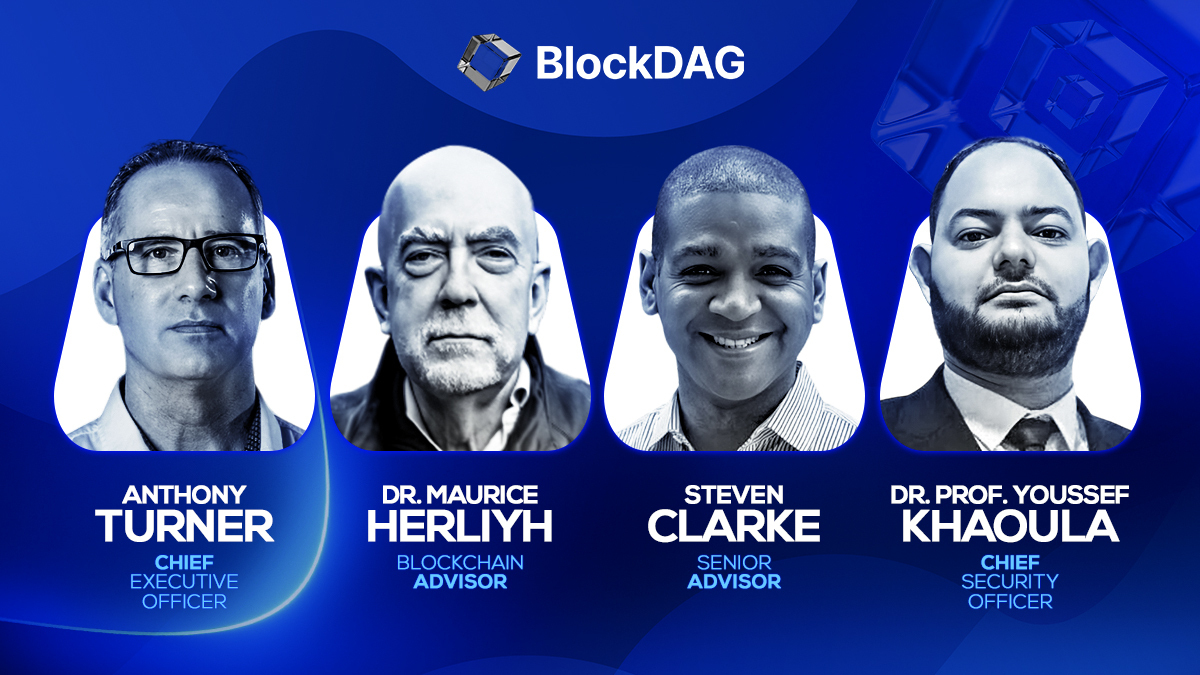
BlockDAG Network’s history is one of innovation, perseverance, and a vision to push the boundaries of blockchain technology. With Harvard alumni, tech moguls, and best-selling authors at the helm, BlockDAG is rewriting the rules of the cryptocurrency game.
CEO Antony Turner, inspired by the successes and shortcomings of Bitcoin and Ethereum, says, “BlockDAG leverages existing technology to push the boundaries of speed, security, and decentralization.” This powerhouse team has led a staggering 1,600% price increase in 20 pre-sale rounds, raising over $63.9 million. The secret? Unparalleled expertise and a bold vision for the future of blockchain.
Let’s dive into BlockDAG’s success story and find out what the future holds for this cryptocurrency.
The Origin: Why BlockDAG Was Created
In a recent interview, BlockDAG CEO Antony Turner perfectly summed up why the market needs BlockDAG’s ongoing revolution. He said:
“The creation of BlockDAG was inspired by Bitcoin and Ethereum, their successes and their shortcomings.
If you look at almost any new technology, it is very rare that the first movers remain at the forefront forever. Later incumbents have a huge advantage in entering a market where the need has been established and the technology is no longer cutting edge.
BlockDAG has done just that: our innovation is incorporating existing technology to provide a better solution, allowing us to push the boundaries of speed, security, and decentralization.”
The Present: How Far Has BlockDAG Come?
BlockDAG’s presale is setting new benchmarks in the cryptocurrency investment landscape. With a stunning 1600% price increase over 20 presale lots, it has already raised over $63.9 million in capital, having sold over 12.43 billion BDAG coins.
This impressive performance underscores the overwhelming confidence of investors in BlockDAG’s vision and leadership. The presale attracted over 20,000 individual investors, with the BlockDAG community growing exponentially by the hour.

These monumental milestones have been achieved thanks to the unparalleled skills, experience and expertise of BlockDAG’s management team:
Antony Turner – Chief Executive Officer
Antony Turner, CEO of BlockDAG, has over 20 years of experience in the Fintech, EdTech, Travel and Crypto industries. He has held senior roles at SPIRIT Blockchain Capital and co-founded Axona-Analytics and SwissOne. Antony excels in financial modeling, business management and scaling growth companies, with expertise in trading, software, IoT, blockchain and cryptocurrency.
Director of Communications
Youssef Khaoulaj, CSO of BlockDAG, is a Smart Contract Auditor, Metaverse Expert, and Red Team Hacker. He ensures system security and disaster preparedness, and advises senior management on security issues.
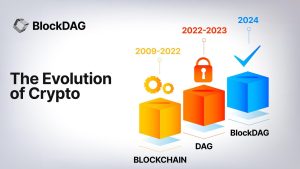
advisory Committee
Steven Clarke-Martin, a technologist and consultant, excels in enterprise technology, startups, and blockchain, with a focus on DAOs and smart contracts. Maurice Herlihy, a Harvard and MIT graduate, is an award-winning computer scientist at Brown University, with experience in distributed computing and consulting roles, most notably at Algorand.
The Future: Becoming the Cryptocurrency with the Highest Market Cap in the World
Given its impressive track record and a team of geniuses working tirelessly behind the scenes, BlockDAG is quickly approaching the $600 million pre-sale milestone. This crypto powerhouse will soon enter the top 30 cryptocurrencies by market cap.
Currently trading at $0.017 per coin, BlockDAG is expected to hit $1 million in the coming months, with the potential to hit $30 per coin by 2030. Early investors have already enjoyed a 1600% ROI by batch 21, fueling a huge amount of excitement around BlockDAG’s presale. The platform is seeing significant whale buying, and demand is so high that batch 21 is almost sold out. The upcoming batch is expected to drive prices even higher.

Invest in BlockDAG Pre-Sale Now:
Pre-sale: https://purchase.blockdag.network
Website: https://blockdag.network
Telegram: https://t.me/blockDAGnetwork
Discord: Italian: https://discord.gg/Q7BxghMVyu
No spam, no lies, just insights. You can unsubscribe at any time.
Tech
How Karak’s Latest Tech Integration Could Make Data Breaches Obsolete
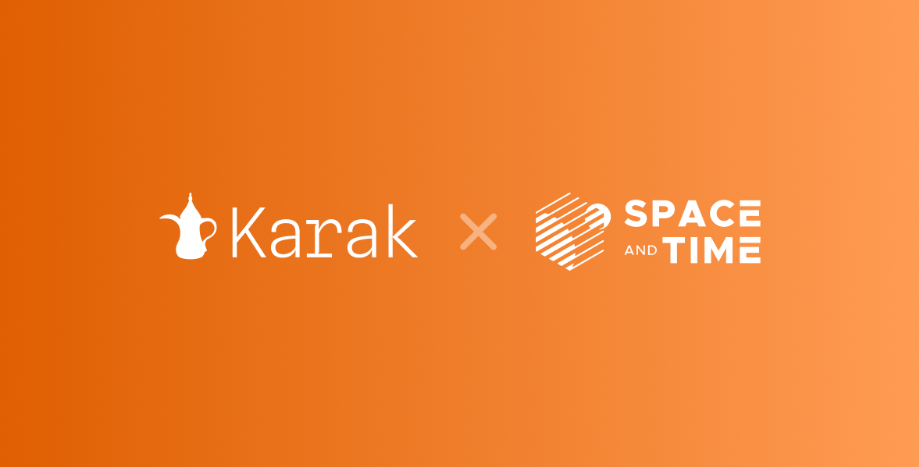
- Space and Time uses zero-knowledge proofs to ensure secure and tamper-proof data processing for smart contracts and enterprises.
- The integration facilitates faster development and deployment of Distributed Secure Services (DSS) on the Karak platform.
Karak, a platform known for its strong security capabilities, is enhancing its Distributed Secure Services (DSS) by integrating Space and Time as a zero-knowledge (ZK) coprocessor. This move is intended to strengthen trustless operations across its network, especially in slashing and rewards mechanisms.
Space and Time is a verifiable processing layer that uses zero-knowledge proofs to ensure that computations on decentralized data warehouses are secure and untampered with. This system enables smart contracts, large language models (LLMs), and enterprises to process data without integrity concerns.
The integration with Karak will enable the platform to use Proof of SQL, a new ZK-proof approach developed by Space and Time, to confirm that SQL query results are accurate and have not been tampered with.
One of the key features of this integration is the enhancement of DSS on Karak. DSS are decentralized services that use re-staked assets to secure the various operations they provide, from simple utilities to complex marketplaces. The addition of Space and Time technology enables faster development and deployment of these services, especially by simplifying slashing logic, which is critical to maintaining security and trust in decentralized networks.
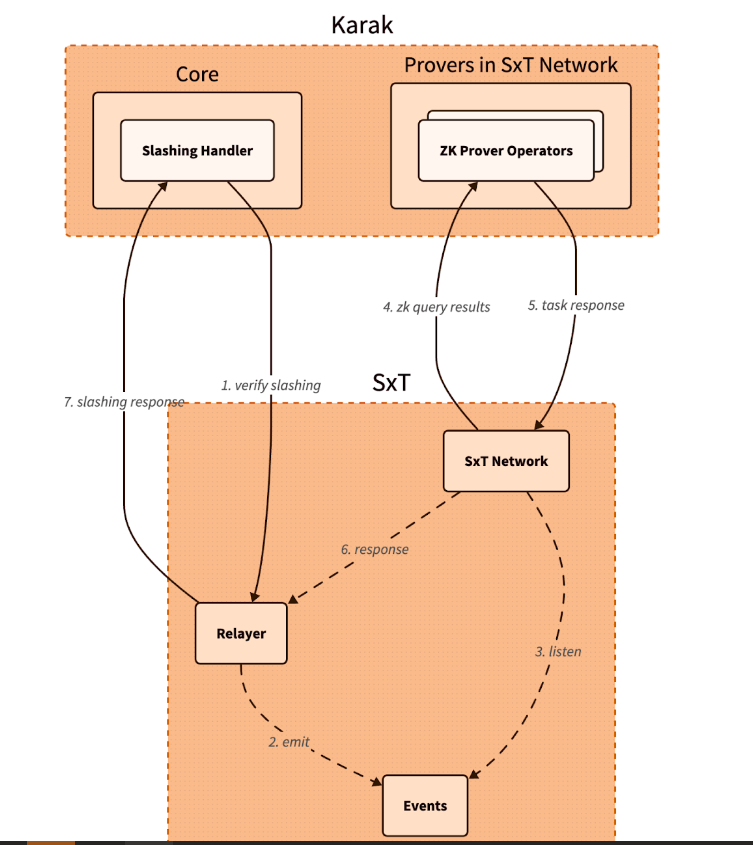
Additionally, Space and Time is developing its own DSS for blockchain data indexing. This service will allow community members to easily participate in the network by running indexing nodes. This is especially beneficial for applications that require high security and decentralization, such as decentralized data indexing.
The integration architecture follows a detailed and secure flow. When a Karak slashing contract needs to verify a SQL query, it calls the Space and Time relayer contract with the required SQL statement. This contract then emits an event with the query details, which is detected by operators in the Space and Time network.
These operators, responsible for indexing and monitoring DSS activities, validate the event and route the work to a verification operator who runs the query and generates the necessary ZK proof.
The result, along with a cryptographic commitment on the queried data, is sent to the relayer contract, which verifies and returns the data to the Karak cutter contract. This end-to-end process ensures that the data used in decision-making, such as determining penalties within the DSS, is accurate and reliable.
Karak’s mission is to provide universal security, but it also extends the capabilities of Space and Time to support multiple DSSs with their data indexing needs. As these technologies evolve, they are set to redefine the secure, decentralized computing landscape, making it more accessible and efficient for developers and enterprises alike. This integration represents a significant step towards a more secure and verifiable digital infrastructure in the blockchain space.
Website | X (Twitter) | Discord | Telegram
No spam, no lies, just insights. You can unsubscribe at any time.
Tech
Cryptocurrency Payments: Should CFOs Consider This Ferrari-Approved Trend?

Iconic Italian luxury carmaker Ferrari has announced the expansion of its cryptocurrency payment system to its European dealer network.
The move, which follows a successful launch in North America less than a year ago, raises a crucial question for CFOs across industries: Is it time to consider accepting cryptocurrency as a form of payment for your business?
Ferrari’s move isn’t an isolated one. It’s part of a broader trend of companies embracing digital assets. As of 2024, we’re seeing a growing number of companies, from tech giants to traditional retailers, accepting cryptocurrencies.
This change is determined by several factors:
- Growing mainstream adoption of cryptocurrencies
- Growing demand from tech-savvy and affluent consumers
- Potential for faster and cheaper international transactions
- Desire to project an innovative brand image
Ferrari’s approach is particularly noteworthy. They have partnered with BitPay, a leading cryptocurrency payment processor, to allow customers to purchase vehicles using Bitcoin, Ethereum, and USDC. This satisfies their tech-savvy and affluent customer base, many of whom have large digital asset holdings.
Navigating Opportunities and Challenges
Ferrari’s adoption of cryptocurrency payments illustrates several key opportunities for companies considering this move. First, it opens the door to new customer segments. By accepting cryptocurrency, Ferrari is targeting a younger, tech-savvy demographic—people who have embraced digital assets and see them as a legitimate form of value exchange. This strategy allows the company to connect with a new generation of affluent customers who may prefer to conduct high-value transactions in cryptocurrency.
Second, cryptocurrency adoption increases global reach. International payments, which can be complex and time-consuming with traditional methods, become significantly easier with cryptocurrency transactions. This can be especially beneficial for businesses that operate in multiple countries or deal with international customers, as it potentially reduces friction in cross-border transactions.
Third, accepting cryptocurrency positions a company as innovative and forward-thinking. In today’s fast-paced business environment, being seen as an early adopter of emerging technologies can significantly boost a brand’s image. Ferrari’s move sends a clear message that they are at the forefront of financial innovation, which can appeal to customers who value cutting-edge approaches.
Finally, there is the potential for cost savings. Traditional payment methods, especially for international transactions, often incur substantial fees. Cryptocurrency transactions, on the other hand, can offer lower transaction costs. For high-value purchases, such as luxury cars, these savings could be significant for both the business and the customer.
While the opportunities are enticing, accepting cryptocurrency payments also presents significant challenges that businesses must address. The most notable of these is volatility. Cryptocurrency values can fluctuate dramatically, sometimes within hours, posing potential risk to businesses that accept them as payment. Ferrari addressed this challenge by implementing a system that instantly converts cryptocurrency received into traditional fiat currencies, effectively mitigating the risk of value fluctuations.
Regulatory uncertainty is another major concern. The legal landscape surrounding cryptocurrencies is still evolving in many jurisdictions around the world. This lack of clear and consistent regulations can create compliance challenges for companies, especially those operating internationally. Companies must remain vigilant and adaptable as new laws and regulations emerge, which can be a resource-intensive process.
Implementation costs are also a significant obstacle. Integrating cryptocurrency payment systems often requires substantial investment in new technology infrastructure and extensive staff training. This can be especially challenging for small businesses or those with limited IT resources. The costs are not just financial; a significant investment of time is also required to ensure smooth implementation and operation.
Finally, security concerns loom large in the world of cryptocurrency transactions. While blockchain technology offers some security benefits, cryptocurrency transactions still require robust cybersecurity measures to protect against fraud, hacks, and other malicious activity. Businesses must invest in robust security protocols and stay up-to-date on the latest threats and protections, adding another layer of complexity and potential costs to accepting cryptocurrency payments.
Strategic Considerations for CFOs
If you’re thinking of following in Ferrari’s footsteps, here are the key factors to consider:
- Risk Assessment: Carefully evaluate potential risks to your business, including financial, regulatory, and reputational risks.
- Market Analysis: Evaluate whether your customer base is significantly interested in using cryptocurrencies for payments.
- Technology Infrastructure: Determine the costs and complexities of implementing a cryptographic payment system that integrates with existing financial processes.
- Regulatory Compliance: Ensure that cryptocurrency acceptance is in line with local regulations in all markets you operate in. Ferrari’s gradual rollout demonstrates the importance of this consideration.
- Financial Impact: Analyze how accepting cryptocurrency could impact your cash flow, accounting practices, and financial reporting.
- Partnership Evaluation: Consider partnering with established crypto payment processors to reduce risk and simplify implementation.
- Employee Training: Plan comprehensive training to ensure your team is equipped to handle cryptocurrency transactions and answer customer questions.
While Ferrari’s adoption of cryptocurrency payments is exciting, it’s important to consider this trend carefully.
A CFO’s decision to adopt cryptocurrency as a means of payment should be based on a thorough analysis of your company’s specific needs, risk tolerance, and strategic goals. Cryptocurrency payments may not be right for every business, but for some, they could provide a competitive advantage in an increasingly digital marketplace.
Remember that the landscape is rapidly evolving. Stay informed about regulatory changes, technological advancements, and changing consumer preferences. Whether you decide to accelerate your crypto engines now or wait in the pit, keeping this payment option on your radar is critical to navigating the future of business transactions.
Was this article helpful?
Yes No
Sign up to receive your daily business insights
Tech
Bitcoin Tumbles as Crypto Market Selloff Mirrors Tech Stocks’ Plunge
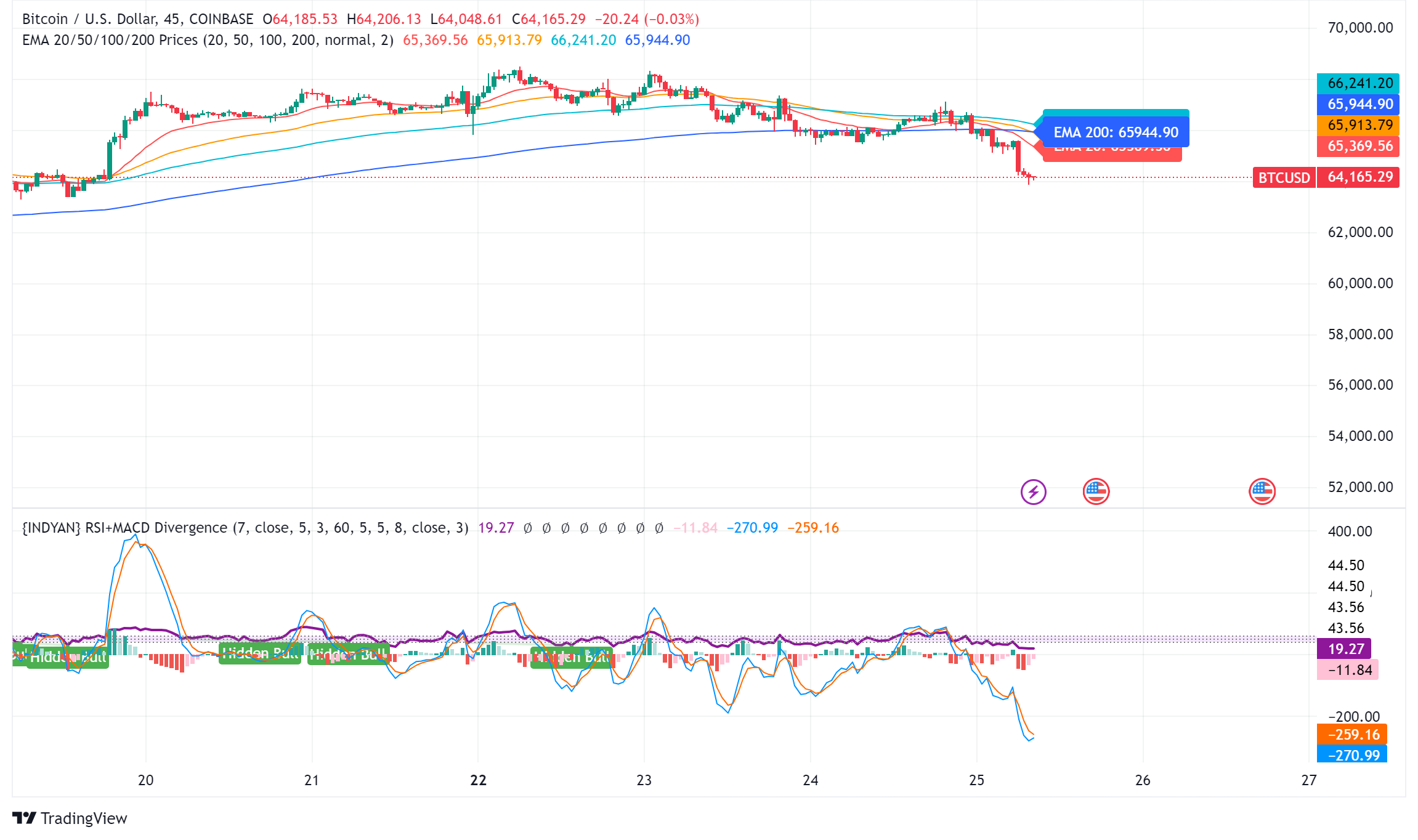
The world’s largest cryptocurrency, Bitcoin (BTC), suffered a significant price decline on Wednesday, falling below $65,000. The decline coincides with a broader market sell-off that has hit technology stocks hard.
Cryptocurrency Liquidations Hit Hard
CoinGlass data reveals a surge in long liquidations in the cryptocurrency market over the past 24 hours. These liquidations, totaling $220.7 million, represent forced selling of positions that had bet on price increases. Bitcoin itself accounted for $14.8 million in long liquidations.
Ethereum leads the decline
Ethereal (ETH), the second-largest cryptocurrency, has seen a steeper decline than Bitcoin, falling nearly 8% to trade around $3,177. This decline mirrors Bitcoin’s price action, suggesting a broader market correction.
Cryptocurrency market crash mirrors tech sector crash
The cryptocurrency market decline appears to be linked to the significant losses seen in the U.S. stock market on Wednesday. Stock market listing The index, heavily weighted toward technology stocks, posted its sharpest decline since October 2022, falling 3.65%.
Analysts cite multiple factors
Several factors may have contributed to the cryptocurrency market crash:
- Tech earnings are underwhelming: Earnings reports from tech giants like Alphabet are disappointing (Google(the parent company of), on Tuesday, triggered a sell-off in technology stocks with higher-than-expected capital expenditures that could have repercussions on the cryptocurrency market.
- Changing Political Landscape: The potential impact of the upcoming US elections and changes in Washington’s policy stance towards cryptocurrencies could influence investor sentiment.
- Ethereal ETF Hopes on the line: While bullish sentiment around a potential U.S. Ethereum ETF initially boosted the market, delays or rejections could dampen enthusiasm.
Analysts’ opinions differ
Despite the short-term losses, some analysts remain optimistic about Bitcoin’s long-term prospects. Singapore-based cryptocurrency trading firm QCP Capital believes Bitcoin could follow a similar trajectory to its post-ETF launch all-time high, with Ethereum potentially converging with its previous highs on sustained institutional interest.
Rich Dad Poor Dad Author’s Prediction
Robert Kiyosaki, author of the best-selling Rich Dad Poor Dad, predicts a potential surge in the price of Bitcoin if Donald Trump is re-elected as US president. He predicts a surge to $105,000 per coin by August 2025, fueled by a weaker dollar that is set to boost US exports.
BTC/USD Technical Outlook
Bitcoin price is currently trading below key support levels, including the $65,500 level and the 100 hourly moving average. A break below the $64,000 level could lead to further declines towards the $63,200 support zone. However, a recovery above the $65,500 level could trigger another increase in the coming sessions.
-

 News10 months ago
News10 months agoVolta Finance Limited – Director/PDMR Shareholding
-

 News10 months ago
News10 months agoModiv Industrial to release Q2 2024 financial results on August 6
-

 News10 months ago
News10 months agoApple to report third-quarter earnings as Wall Street eyes China sales
-

 News10 months ago
News10 months agoNumber of Americans filing for unemployment benefits hits highest level in a year
-

 News1 year ago
News1 year agoInventiva reports 2024 First Quarter Financial Information¹ and provides a corporate update
-

 News1 year ago
News1 year agoLeeds hospitals trust says finances are “critical” amid £110m deficit
-

 DeFi1 year ago
DeFi1 year ago🏴☠️ Pump.Fun operated by Insider Exploit
-

 Tech1 year ago
Tech1 year agoBitcoin’s Correlation With Tech Stocks Is At Its Highest Since August 2023: Bloomberg ⋆ ZyCrypto
-

 Tech1 year ago
Tech1 year agoEverything you need to know
-

 Markets12 months ago
Markets12 months ago20 Top Crypto Trading Platforms to Know
-

 News10 months ago
News10 months agoStocks wobble as Fed delivers and Meta bounces
-

 Markets1 year ago
Markets1 year agoWhale Investments in Bitcoin Hit $100 Billion in 2024, Fueling Insane Investor Optimism ⋆ ZyCrypto












